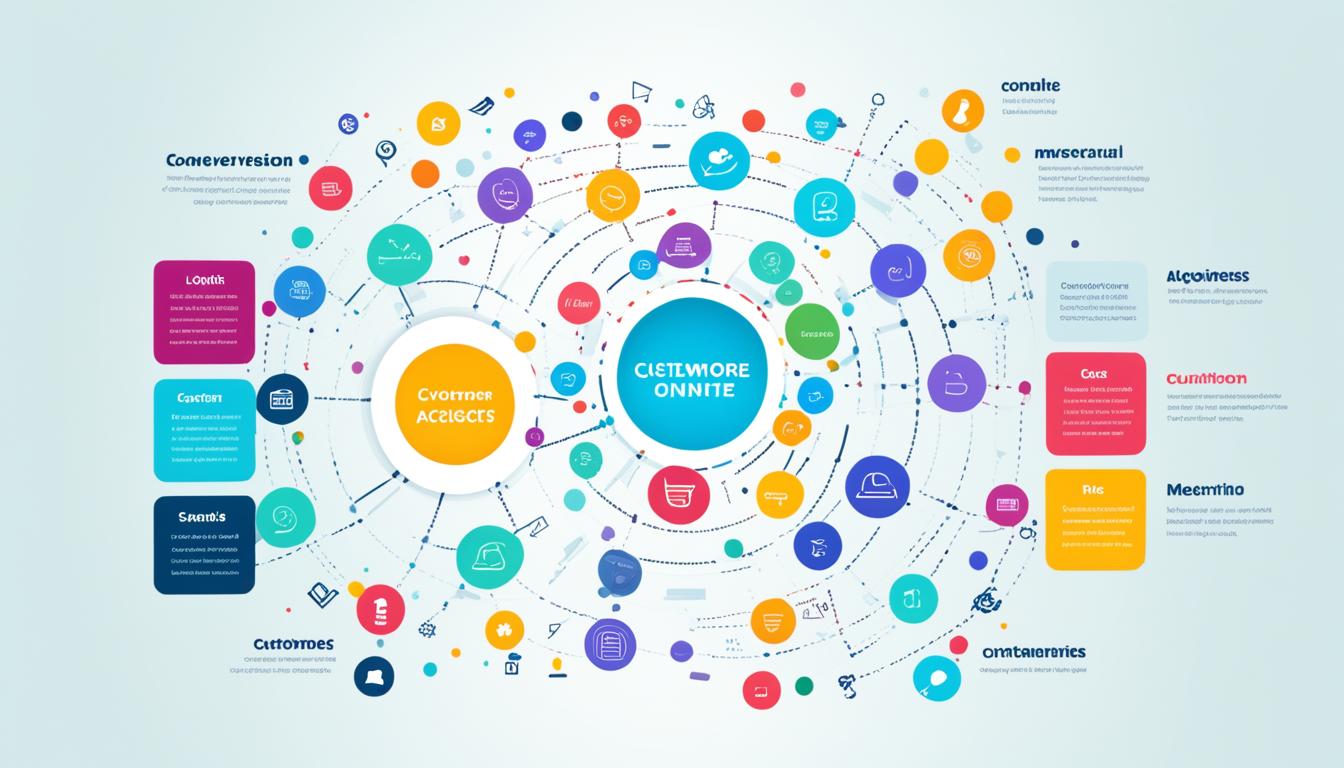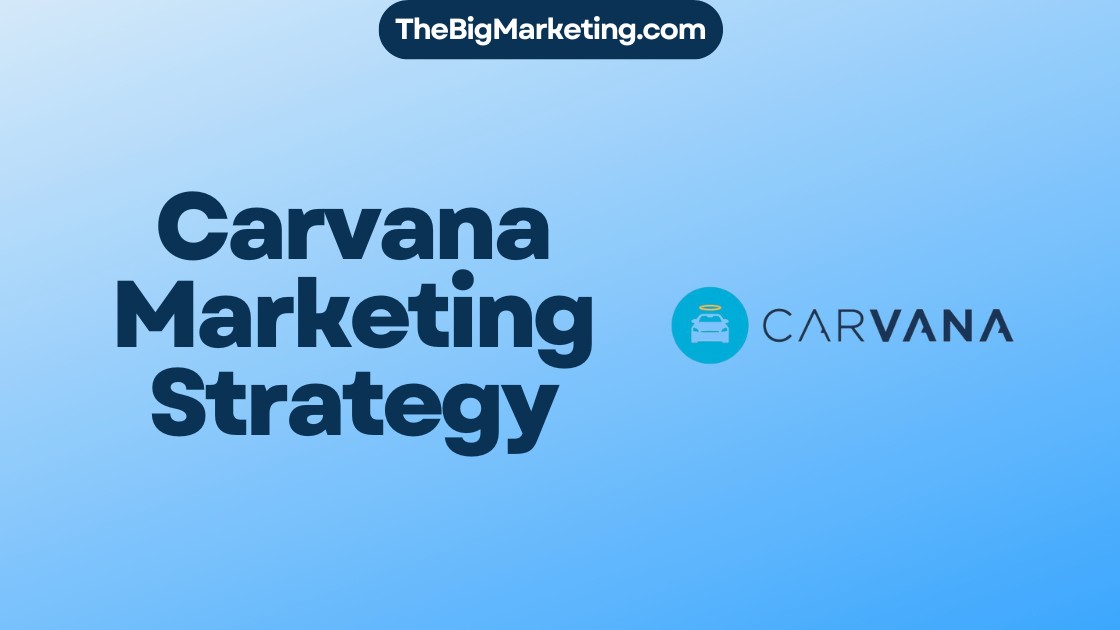In 2024, the logistics industry presents a unique opportunity for companies to implement effective marketing strategies. With the growth of e-commerce, the expansion of global trade, and the advancements in logistics technology, it is crucial for logistics companies to stay ahead of the competition. This article will explore various marketing strategies that can enhance visibility, streamline operations, and boost customer engagement for logistics companies in 2024.
Key Takeaways:
- Implementing digital marketing strategies is essential for logistics companies in 2024 to enhance visibility and stay competitive.
- Logistics companies should leverage supply chain advertising and transportation promotion to reach a wider audience and attract new customers.
- Strategic branding and content marketing are key components for establishing a strong presence in the logistics industry.
- Optimizing SEO for logistics companies can drive organic traffic to their websites and improve search engine rankings.
- By adopting effective marketing strategies, logistics companies can streamline operations, attract new customers, and build long-term relationships with existing customers.
Current Marketing Trends for Logistics Companies in 2024
The logistics industry is continuously evolving, and it is imperative for companies to stay updated with the latest marketing trends to stay competitive. In 2024, several marketing trends have emerged that can greatly benefit logistics companies in reaching their target audience and achieving their marketing goals.
Leveraging Content Across Various Media
One of the key marketing trends for logistics companies in 2024 is the strategic use of content across various media channels. This includes creating high-quality textual, video, voice, and visual content that resonates with the target audience and is optimized for both desktop and mobile devices. By leveraging content across multiple channels, logistics companies can maximize their reach and engage customers effectively.
Implementing Conversational Marketing Strategies
Conversational marketing has gained significant traction in recent years, and it continues to be a prominent trend in the logistics industry in 2024. Logistics companies can harness the power of chatbots, live chats, and voice assistants to initiate conversations with customers, provide personalized experiences, answer queries promptly, and build trust. By incorporating conversational marketing strategies, logistics companies can strengthen their relationships with customers and enhance customer satisfaction.
Embracing Artificial Intelligence (AI) and Machine Learning (ML)
Artificial intelligence (AI) and machine learning (ML) have become integral parts of the logistics industry, transforming various aspects of marketing. In 2024, logistics companies are increasingly utilizing AI and ML algorithms to analyze vast amounts of data, predict customer behavior, and deliver personalized experiences. These technologies enable logistics companies to optimize their marketing strategies, enhance operational efficiency, and stay ahead of the competition.
Focusing on Organic SEO
Organic search engine optimization (SEO) remains a crucial aspect of marketing for logistics companies in 2024. By optimizing their websites and content with relevant keywords, creating mobile-friendly experiences, and incorporating voice search optimization, logistics companies can improve their online visibility and attract organic traffic. Maintaining a strong online presence through targeted content creation and engaging social media strategies is essential for effective organic SEO.
Summary of Current Marketing Trends for Logistics Companies in 2024
In summary, logistics companies in 2024 need to stay abreast of the latest marketing trends to remain competitive. By leveraging content across various media, implementing conversational marketing strategies, embracing AI and ML, and focusing on organic SEO, logistics companies can effectively reach their target audience and drive business growth. It is crucial for logistics companies to adapt their marketing strategies to align with industry trends and meet the evolving needs of their customers.
Leveraging Content Across Various Media in Logistics Marketing
Creating and leveraging content across various media channels is a key marketing strategy for logistics companies in 2024. By developing textual, video, voice, and visual content optimized for desktop and mobile devices, logistics companies can effectively engage their target audience and enhance their brand visibility.
Multi-channel Content Strategy
A multi-channel content strategy is crucial for logistics companies to reach their audience through different platforms and media. This involves creating content that is suitable for various channels such as websites, social media platforms, email marketing, and more. By utilizing a multi-channel approach, logistics companies can maximize their reach and engage customers at different touchpoints.
Textual, Video, Voice, and Visual Content for Logistics
Diversifying content formats is essential for logistics companies to cater to different preferences and consumption habits of their target audience. A well-rounded content strategy should include textual content in the form of blogs, articles, and whitepapers, video content such as product demos, interviews, or brand storytelling, voice content for voice search optimization or podcasts, and visual content like infographics and images.
Logistics companies can experiment with these different formats to engage their audience and deliver their message effectively. Each format has its unique strengths and benefits, offering opportunities to connect with customers in different ways and provide valuable information.
Content Repurposing in Logistics Marketing
Content repurposing is a valuable tactic in logistics marketing that involves transforming existing content into new formats or repackaging it for different platforms. For example, a blog post can be repurposed into a video or podcast episode, reaching a broader audience and enhancing engagement.
By repurposing content, logistics companies can make the most of their existing assets, extend their reach, and reinforce their key messages. It also allows for optimization across various media channels and ensures consistent branding and messaging.
Leveraging Data Analytics
Data analytics plays a crucial role in understanding audience preferences and optimizing the content strategy. By analyzing data on content performance, logistics companies can gain insights into which formats, topics, or channels resonate the most with their target audience.
This data-driven approach enables logistics companies to make informed decisions about content creation and distribution, ensuring that their efforts align with customer interests and drive maximum engagement.
Incorporating a multi-channel content strategy, leveraging textual, video, voice, and visual content, repurposing existing content, and utilizing data analytics are essential elements of effective logistics marketing in 2024. By adopting these strategies, logistics companies can connect with their audience, build brand authority, and drive business growth.
Conversational Marketing for Logistics Companies
Conversational marketing has become an essential tool for engaging customers and building strong relationships in the logistics industry. By utilizing chatbots, live chats, voice assistants, and other mediums, logistics companies can initiate conversations with their customers and provide personalized and inclusive experiences. This allows companies to address customer queries efficiently, offer real-time assistance, and build trust in their brand.
One of the key advantages of conversational marketing is its ability to create personalized customer experiences. By leveraging technology, logistics companies can gather valuable insights about their customers’ preferences, behavior, and needs. This information can then be utilized to provide tailored solutions, recommendations, and offers, enhancing customer satisfaction and loyalty.
Incorporating Chatbots for Engaging Conversations
Implementing chatbots is a popular approach for logistics companies looking to streamline their customer interactions. These automated conversational agents can handle a wide array of customer inquiries, from tracking packages to resolving common issues. Chatbots can work around the clock, providing instant responses and freeing up customer service representatives to focus on more complex tasks.
Live chats are another effective conversational marketing tool for logistics companies. By offering real-time communication with customer support representatives, live chats enable companies to provide immediate assistance and address any concerns or questions that customers may have. This leads to enhanced customer satisfaction and a higher likelihood of repeat business.
Personalized Experiences and Building Trust
In the logistics industry, personalized customer experiences are essential for building trust and loyalty. Conversational marketing enables companies to gather relevant customer data and utilize it to deliver tailored recommendations, offers, and solutions. By providing personalized experiences, logistics companies can showcase their understanding of their customers’ unique needs and preferences, fostering a deeper connection and trust with their audience.
Social media platforms provide an ideal channel for engaging in conversational marketing. By actively participating in discussions, responding to customer inquiries, and sharing relevant content, logistics companies can establish themselves as authorities in the industry and build a strong online presence.
Ultimately, conversational marketing plays a crucial role in the success of logistics companies by offering personalized customer experiences, strengthening brand trust, and increasing customer engagement. By leveraging chatbots, live chats, and other conversational marketing strategies, logistics companies can create meaningful connections with their customers, address their pain points, and drive business growth.
Embracing Artificial Intelligence (AI) and Machine Learning (ML) in Logistics Marketing
In the era of technological advancements, artificial intelligence (AI) and machine learning (ML) have revolutionized the logistics industry. With AI and ML algorithms, logistics companies can now extract valuable insights from vast amounts of data, enabling them to make data-driven decisions and optimize their marketing strategies.
AI and ML empower logistics companies to analyze customer behavior, predict trends, and personalize customer experiences. By harnessing the power of AI and ML, companies can create targeted marketing campaigns that resonate with their audience, ultimately boosting customer engagement and loyalty.
Data analytics plays a crucial role in leveraging AI and ML in logistics marketing. Through data analytics, logistics companies can gain a deep understanding of customer preferences, identify patterns and trends, and optimize their marketing efforts accordingly.
By employing AI and ML, logistics companies can align their business strategies with supply chain trends, ensuring operational efficiency and staying ahead of the competition. These technologies enable predictive analytics, allowing companies to forecast demand and optimize their inventory management, ultimately improving the overall customer experience.
Ultimately, embracing AI and ML in logistics marketing opens up new possibilities for personalized customer experiences, efficient operations, and data-driven decision-making. By leveraging these technologies and leveraging data analytics, logistics companies can gain a competitive edge in the rapidly evolving landscape of the logistics industry.
Importance of Organic SEO in Logistics Marketing
Organic SEO plays a vital role in the marketing strategy for logistics companies. By optimizing websites and content with relevant keywords, logistics companies can improve their online visibility and attract organic traffic. Effective website and content optimization, along with mobile-friendly experiences and voice search optimization, can significantly impact a logistics company’s search engine rankings.
Website and Content Optimization
Website optimization involves implementing SEO best practices to enhance the performance, user experience, and visibility of a logistics company’s website. This includes optimizing website design, navigation, loading speed, and mobile responsiveness. By optimizing the content with relevant keywords, logistics companies can increase their chances of ranking higher in search engine results pages (SERPs).
Mobile-Friendly Websites
In today’s digital landscape, having a mobile-friendly website is crucial for logistics companies. With the increasing number of users accessing the internet through mobile devices, it is essential to ensure that websites are optimized for mobile viewing. Mobile-friendly websites not only provide a better user experience but also improve search engine rankings. Logistics companies should prioritize responsive design, fast loading speed, and easy navigation on mobile devices.
Voice Search Optimization
The rise of voice search technology has transformed the way users interact with search engines. Optimizing content for voice search is becoming increasingly important for logistics companies to stay ahead of the competition. Voice search optimization involves understanding user intent, incorporating conversational language, and providing concise, accurate answers to commonly asked questions. By optimizing website content for voice search, logistics companies can target voice search users and enhance their online presence.
Targeted Content Strategy
Developing a targeted content strategy is crucial for logistics companies to attract and engage their target audience. This strategy may include a mix of short-form blogs, long-form informative articles, and engaging visual content. By creating high-quality content that is valuable to the target audience and aligns with their interests and needs, logistics companies can build brand visibility, establish thought leadership, and generate leads.
Social Media Presence
A strong social media presence is vital for logistics companies to connect with their target audience and build brand awareness. By actively engaging on social media platforms, sharing informative content, and interacting with followers, logistics companies can enhance their online visibility, drive traffic to their website, and nurture customer relationships. Social media platforms also offer valuable insights through analytics, allowing logistics companies to measure the impact of their marketing efforts and make data-driven decisions.
| Benefits of Organic SEO in Logistics Marketing |
|---|
| Improved online visibility and search engine rankings |
| Increased organic traffic to the website |
| Enhanced user experience and engagement |
| Targeted reach to the intended audience |
| Cost-effective method of marketing |
| Provides analytics and insights for continuous improvement |
Define Your Service Offer in Logistics Business Marketing
Defining your service offer is essential for effective marketing in the logistics industry. Logistics companies should clearly define the services they offer, including the modes of transportation, the type of technology and tracking services provided, and whether they operate domestically or globally. Developing a brand strategy that outlines the positioning statement and messaging platform is crucial for presenting a cohesive and compelling service offer.
Service Offer Details
When defining your service offer in logistics business marketing, it is important to provide specific details that highlight the unique value your company brings to the industry. This includes:
- The modes of transportation your company specializes in, such as air freight, sea freight, trucking, or a combination of these.
- The technology and tracking services your company utilizes to ensure efficient and reliable delivery, such as GPS tracking, real-time updates, or advanced warehouse management systems.
- The extent of your company’s reach, whether it operates domestically, internationally, or both, and the regions or countries it serves.
In addition to the services offered, logistics companies should develop a brand strategy that reflects their unique positioning in the market and effectively communicates their value proposition to customers. This brand strategy should align with the overall marketing goals and target audience of the company.
Brand Strategy in Logistics Marketing
A brand strategy outlines the positioning statement and messaging platform of a logistics company, providing a clear direction for marketing efforts. It encompasses the following elements:
- Positioning statement: This succinctly describes the unique value your company offers and how it differentiates itself from competitors. It should be concise, memorable, and resonate with your target audience. For example, a positioning statement could be “Delivering seamless supply chain solutions for global businesses”.
- Messaging platform: This includes the key messages and value propositions that support the positioning statement. These messages should be tailored to different target audiences and should highlight the benefits and advantages your company provides. Consider the specific pain points of your target market and how your services address them.
By defining your service offer and developing a strong brand strategy, your logistics company can effectively communicate its unique value proposition to customers, differentiate itself in the market, and attract and retain customers.
Identify Your Target Markets in Logistics Business Marketing
Identifying the primary and secondary markets is an important step in logistics business marketing. To effectively target your marketing efforts, it is crucial to evaluate the types of goods you transport, such as food, materials, electronics, and more. By understanding the specific market segments you serve, you can tailor your messaging, promotions, and services to meet their unique needs.
A comprehensive market research strategy is essential for logistics companies to identify and analyze potential target markets. By conducting thorough market research, you can gain insights into industry trends, customer preferences, and competitor activities. This information will help you make data-driven decisions and develop effective marketing strategies that resonate with your target audience.
Regularly reassessing the market opportunities and demographics is crucial for staying ahead in the dynamic logistics industry. Changes in consumer behavior, emerging markets, and economic factors can impact your target markets. By continuously monitoring market trends and adapting your marketing efforts accordingly, you can adjust your marketing goals and budget effectively, ensuring maximum return on investment (ROI).
Key Steps to Identify Your Target Markets:
- Define the types of goods your logistics company transports.
- Research the target market segments that correspond to those goods.
- Analyze industry trends, including emerging markets and demand patterns.
- Collect data on customer preferences and buying behaviors.
- Identify your competitors and understand their target markets.
- Continuously monitor market trends and reassess your target markets.
Analyze Your Competition in Logistics Business Marketing
When it comes to marketing in the logistics industry, analyzing the competition is a crucial step. By identifying your direct competitors and carefully assessing their offerings, strengths, and weaknesses, you can gain valuable insight into the market landscape.
Understanding the competition allows you to identify opportunities for gaining a competitive advantage and differentiate your business from others in the market. This analysis helps you determine your unique selling points and showcase your strengths to potential customers.
In addition to analyzing your competition, building strategic partnerships with other logistics companies can also be advantageous. Collaborating with trusted partners allows you to enhance your service capabilities, expand your market reach, and offer more comprehensive solutions to your customers.
By conducting a comprehensive competition analysis and leveraging strategic partnerships, you can position your logistics business for success in a highly competitive market.
| Competitor | Offerings | Strengths | Weaknesses |
|---|---|---|---|
| Company A | Provides same-day delivery | Extensive network of vehicles | Higher prices |
| Company B | Offers specialized handling of fragile items | Reputation for excellent customer service | Limited coverage area |
| Company C | Focuses on sustainable transportation | Strong environmental credentials | Smaller fleet size |
Through a thorough analysis of your competition and strategic partnerships, you can position your logistics business for success in a highly competitive market. By leveraging your strengths, addressing weaknesses, and providing unique value to your customers, you can differentiate yourself and establish a strong presence.
Articulate Your Value Proposition in Logistics Business Marketing
When it comes to marketing in the logistics industry, articulating a strong value proposition is essential. Logistics companies need to clearly define what sets them apart from the competition and how they deliver value to their customers. This value proposition serves as a unique selling proposition (USP) that attracts and retains customers in a highly competitive market.
The value proposition can encompass various factors that differentiate logistics companies. One aspect could be offering competitive pricing, ensuring that customers receive cost-effective solutions without compromising on quality. Another aspect could be leveraging newer technologies to optimize operations, enhance efficiency, and provide innovative solutions for transportation and supply chain management.
Operational efficiencies are also a key component of the value proposition. Logistics companies that can streamline processes and minimize delays and disruptions deliver value by ensuring reliable and timely deliveries. This includes efficient inventory management, accurate tracking systems, and effective communication throughout the supply chain.
Reliability and guarantees are additional elements that contribute to the value proposition. Providing customers with peace of mind through service guarantees, such as on-time delivery or 24/7 customer support, builds trust and establishes the logistics company as a reliable partner in the industry.
Communicating the unique selling proposition effectively through branding efforts is crucial. By highlighting the strengths and advantages of their services, logistics companies can differentiate themselves and attract customers who resonate with their value proposition.

| Key Elements of a Strong Value Proposition |
|---|
| Competitive pricing |
| Newer technology and innovation |
| Operational efficiencies |
| Reliability and guarantees |
By articulating a compelling value proposition, logistics companies can effectively position themselves in the market and attract customers who align with their unique strengths. Ultimately, a strong value proposition contributes to the overall success and growth of a logistics business in an evolving and competitive industry.
Conclusion
Implementing effective marketing strategies is crucial for the success of logistics companies in 2024. By leveraging content across various media channels, embracing conversational marketing, harnessing the power of AI and ML, and focusing on organic SEO, logistics companies can enhance their visibility, streamline operations, and boost customer engagement.
To stay ahead of the competition, it is important for logistics companies to stay up-to-date with the latest market trends and understand the evolving landscape of the industry. By defining their service offerings, identifying target markets, analyzing competition, and articulating their value proposition, logistics companies can effectively position themselves in the market and attract the right customers.
By implementing these marketing strategies, logistics companies can streamline their operations, improve customer engagement, and achieve their marketing goals in 2024. It is crucial for logistics companies to adapt to the changing dynamics of the industry and leverage the power of marketing to drive their success.
FAQ
What are some effective marketing strategies for logistics companies in 2024?
Some effective marketing strategies for logistics companies in 2024 include leveraging content across various media, implementing conversational marketing strategies, embracing artificial intelligence (AI) and machine learning (ML), and focusing on organic SEO through website and content optimization.
What are the current marketing trends for logistics companies in 2024?
The current marketing trends for logistics companies in 2024 include leveraging content across various media, implementing conversational marketing strategies, embracing artificial intelligence (AI) and machine learning (ML), and focusing on organic SEO through website and content optimization.
How can logistics companies leverage content across various media in their marketing strategies?
Logistics companies can leverage content across various media channels by developing textual, video, voice, and visual content that is optimized for desktop and mobile devices. They can also repurpose existing blogs into videos or podcasts and create content with specific intent to serve their target audience.
How can conversational marketing be used in the logistics industry?
Conversational marketing can be used in the logistics industry by utilizing chatbots, live chats, voice assistants, and other mediums to initiate conversations with customers and provide personalized and inclusive experiences. It can help logistics companies engage with their target audience, answer frequently asked questions, and build brand trust.
How can AI and ML be embraced in logistics marketing?
AI and ML can be embraced in logistics marketing by utilizing algorithms to analyze data, predict customer behavior, and create personalized experiences. These technologies can also optimize business strategies by aligning with supply chain trends and improving operational efficiency. Data analytics is crucial for leveraging AI and ML in logistics marketing.
Why is organic SEO important for logistics companies?
Organic SEO is important for logistics companies because it helps improve online visibility and attract organic traffic. Optimizing websites and content with relevant keywords, creating mobile-friendly experiences, and implementing voice search optimization can all contribute to better organic SEO in the logistics industry.
How should logistics companies define their service offer in marketing?
Logistics companies should clearly define the services they offer, including the modes of transportation, the type of technology and tracking services provided, and whether they operate domestically or globally. Developing a brand strategy that outlines the positioning statement and messaging platform is crucial for presenting a cohesive and compelling service offer.
How can logistics companies identify their target markets in marketing?
Logistics companies can identify their target markets by evaluating the types of goods they transport, such as food, materials, electronics, etc., and determining their market focus accordingly. Regularly reassessing market opportunities and demographics is crucial for adjusting marketing goals and budget effectively in the logistics industry.
Why is it important for logistics companies to analyze their competition in marketing?
Analyzing the competition is important for logistics companies as it helps in identifying direct competitors, analyzing their offerings, strengths, and weaknesses. Understanding the competition helps in identifying a competitive advantage and differentiating the business from others in the market. Building strategic partnerships with other logistics companies can also help in enhancing service capabilities and expanding market reach.
How can logistics companies articulate their value proposition in marketing?
Logistics companies can articulate their value proposition by clearly defining what sets them apart from the competition and how they deliver value to their customers. This could be through lower prices, newer technology, operational efficiencies, or guarantees. Communicating the unique selling proposition (USP) effectively through branding efforts helps in attracting and retaining customers in a highly competitive market.
What are some key takeaways for effective marketing strategies for logistics companies in 2024?
Some key takeaways for effective marketing strategies for logistics companies in 2024 include leveraging content across various media, embracing conversational marketing, harnessing the power of AI and ML, focusing on organic SEO, defining the service offer, identifying target markets, analyzing competition, and articulating the value proposition.







